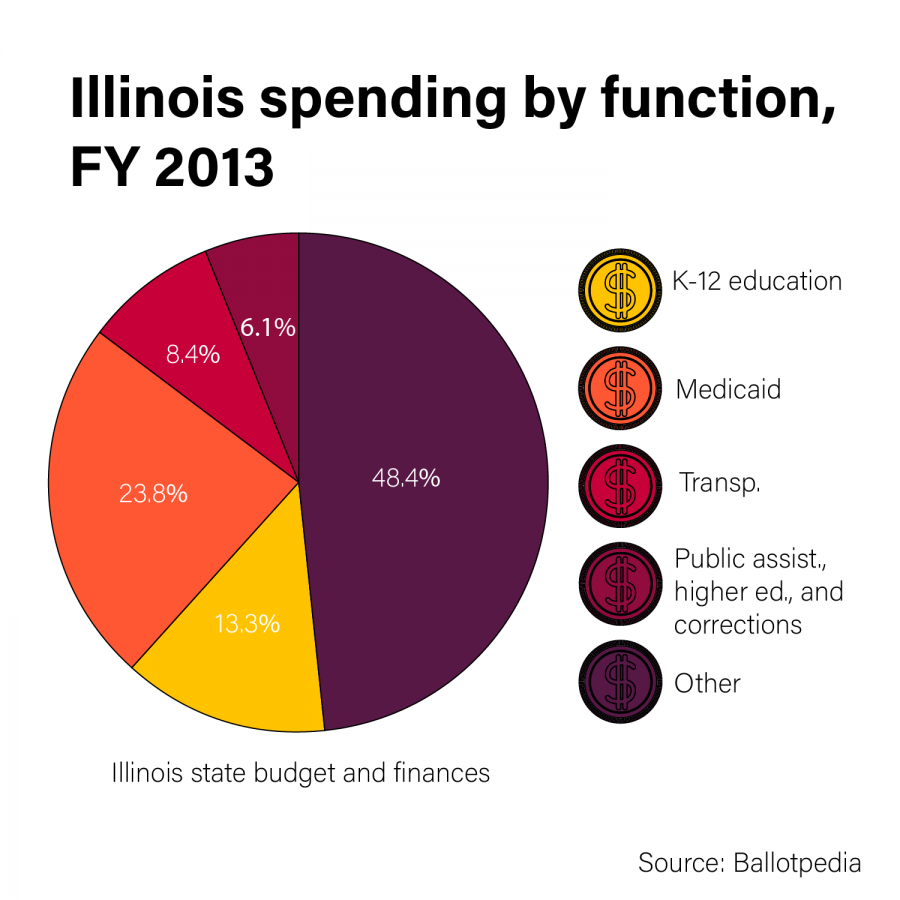Governor ups budget for public universities
Mar 28, 2019
Illinois Governor J.B. Pritzker recently proposed a 5 percent increase in state funding for public universities and community colleges to help increase college affordability.
In his first state budget address, Pritzker outlined his ideas for the fiscal year, the investments he wants to make in the Illinois budget and some notable changes to the education budget.
“The governor’s proposed operating budget for the State of Illinois in fiscal (year) 2020 is his recommended blueprint for state spending in the next year, and the General Assembly has until the end of May to complete its work in the spring legislative session, including presenting the governor with a budget he can accept or selectively veto,” Tom Hardy, executive director of University Relations, said in an email. “In other words, it was the first step in a three-month process.”
The University of Illinois System President Tim Killeen released a statement in a newsletter regarding the fiscal year 2020 budget. He expressed his gratitude to the governor for making education a priority in the proposal.
In addition, the new budget adds $50 million for the Monetary Award Program grant, which helps more than 15,000 low-income students attend college.
Get The Daily Illini in your inbox!
“We hope the legislature adopts his spending plan and approves funding to support our growing enrollment, our ongoing efforts to hold down student costs and our push to provide the workforce and innovation that are essential to move Illinois forward,” Killeen said.
According to Nyle Robinson, interim executive director of the Illinois Board of Higher Education, funding for higher education is critical because it supports students, institutions of higher learning and the state’s economy.
Robinson said in an email the greatest problem for higher education is funding, with related issues of affordability, reversing the outmigration of students from Illinois and improving racial and ethnic equity in college completion.
“Illinois high school graduates who attend colleges or universities in Illinois are more likely to find a job in Illinois and become taxpayers,” Robinson said.
Robinson also claimed state resources for funding are critical for the future of students.
“Illinois needs more qualified individuals to fill the jobs of the future,” Robinson said. “We must increase support to help reduce the proportion of students leaving the state to attend college.”
In 2015, 60 to 70 percent of jobs required a degree or quality certificate, but today, only 51 percent of the students who completed lower education continued to achieve a degree or quality certificate, Robinson said.
“College affordability is a paramount investment in near term economic growth for our state,” Pritzker said in his budget address.
In addition, Robinson said college graduates earn substantially more than individuals without such credentials.
“State funding helps keep college affordable,” Robinson said. “While public university spending in Illinois overall has only increased roughly in line with inflation since 2002, the proportion of costs covered by state appropriations has declined from 72 percent to 35 percent.”
Paul Ellinger, associate chancellor and vice provost for budget and resource planning for the University, said in an email funding for education is crucial for the University to deliver on important public goods.
“State resources are critical to supplement tuition and fees in order to provide students with the quality of education and training needed to succeed,” Ellinger said. “Our land grant mission requires us to deliver quality education, perform innovative research, enhance economic development and engage closely with State of Illinois stakeholders.”
Pritzker’s proposed budget plan is a 5 percent increase, resulting in a $52 million increase in operating funds for state universities and $13.9 million in new funding for community colleges.
The money distribution is determined on a formula-based comparison of historical allocations to colleges and universities. The University will be receiving some money from the budget increase which will be allocated to partial funding of some of the University’s goals, such as faculty and staff retention, new faculty and student recruitment along with several others.
“However, the anticipated increase in funding will not fully support these priorities,” Ellinger said.
According to the Chicago Sun Times, higher education officials have supported Pritzker’s proposed $137 million increase in higher education funding. This proposal is the largest increase higher education would see since fiscal year 2002.
The Illinois Board of Higher Education has also expressed their appreciation for Pritzker’s proposed budget.
“While IBHE passed a budget with a 16.6 percent increase for operations and student assistance, we support Gov. J.B. Pritzker’s proposed budget, which includes an increase of 6.9 percent,” Robinson said. “We are pleased to see that he values higher education in Illinois.”






